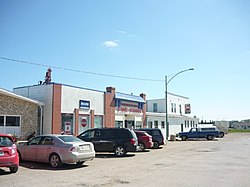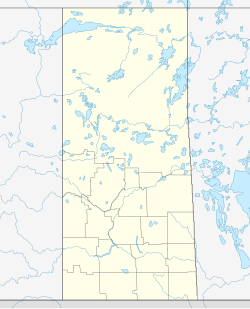Bruno, Saskatchewan
Bruno | |
|---|---|
 Main Street | |
Location of Bruno in Saskatchewan | |
| Coordinates: 52°15′50″N 105°31′16″W / 52.264°N 105.521°W | |
| Country | Canada |
| Province | Saskatchewan |
| Census division | No. 15 |
| Rural Municipality | Bayne |
| Post office Founded | 1906 |
| Government | |
| • Mayor | Dale Glessman |
| • MLA Humboldt | Donna Harpauer |
| • MP Saskatoon--Humboldt | Brad Trost |
| Area | |
| • Land | 0.95 km2 (0.37 sq mi) |
| Population (2011) | |
| • Total | 574 |
| • Density | 606.1/km2 (1,570/sq mi) |
| Time zone | CST |
| Postal code | S0K 0S0 |
| Area code | 306 |
| [1][2][3] | |
Bruno is a town located 90 km east of Saskatoon and 35 km west of Humboldt. Its current mayor is Dale Glessman.[4]
Bruno is the only community in the prairies to hold an annual cherry festival.[5]

Bruno Clayworks, located 4 km west of Bruno, produced over one million bricks between the years 1905 and the 1960s.[6] The historic Old Fire Hall and Jail, a heritage building housing the Bruno Museum, was built from bricks manufactured at the brick plant,[7] as were many other area buildings. The bricks manufactured by the Bruno Clayworks were a unique sideways "T" shape which allowed rows of bricks to interlock when rotated 180º.
History
Bruno was named after Father Bruno Doefler,[8] who came to the area along with other Germans from Minnesota in 1902.[9]
From 1911 to 1919 Bruno Doefler was Abbot of the Territorial Abbey of Saint Peter-Muenster.[10] The territory of the Territorial abbey (Abbey Nullius) which included Bruno was also referred to as St. Peter's Colony.[11]
Ursuline Convent
In 1919 the Ursuline Sisters opened a convent and in 1922 an academy called St. Ursula's Academy was established. The convent and academy building of 1919 was expanded in the 1950s with an extension which included the chapel. In 1952 there were 80 professed sisters, up from 55 in 1934.[12] Additional building expansions happened in 1962 (gymnasium) and 1977 (convent infirmary wing). The academy graduated its last class in 1982.[13]
Eight stained glass windows from the convent chapel have been moved to the Holy Spirit Church in Saskatoon, Vanier Collegiate in Moose Jaw, and Villa Angela and the Humboldt Museum[note 1] in nearby Humboldt.[14]
St. Therese Institute of Faith and Mission
On July 1, 2007, the Ursuline facility changed ownership and became the home of St. Therese Institute of Faith and Mission, a Catholic post-secondary school of faith formation;[15] and the St. Therese Healing and Growth Center (now no longer operating[16]), a retreat center for personal inner healing based on Catholic and scriptural traditions.[17] St. Therese Institute opened its doors to its inaugural class in September 2007; the Healing and Growth Center operated from 2008 to 2015. St. Therese Institute of Faith and Mission (and from 2007-2008, St. Therese Catholic College of Faith and Mission) is the operating name of St. Therese School of Faith and Mission Inc. It is a Canadian registered charitable organization.[18]
Demographics
In the 2021 Census of Population conducted by Statistics Canada, Bruno had a population of 604 living in 274 of its 299 total private dwellings, a change of -1.1% from its 2016 population of 611. With a land area of 0.94 km2 (0.36 sq mi), it had a population density of 642.6/km2 (1,664.2/sq mi) in 2021.[19]
| 2021 | 2011 | |
|---|---|---|
| Population | 604 (-1.1% from 2016) | 574 (+16% from 2006) |
| Land area | 0.94 km2 (0.36 sq mi) | 0.95 km2 (0.37 sq mi) |
| Population density | 643/km2 (1,670/sq mi) | 606.1/km2 (1,570/sq mi) |
| Median age | 49.2 (M: 50.0, F: 48.4) | 49.9 (M: 49.6, F: 49.9) |
| Private dwellings | 299 (total) 274 (occupied) | 294 (total) |
| Median household income | $58,000 |
See also
Notes
- ^ The Natural History Museum of Berlin, in Germany, has been popularly known for 60 years as the "Humboldt Museum" (from 1949 to 2009). This other Museum in Saskatchewan, Canada, has nothing to do with the German museum located in Berlin.
References
- ^ National Archives, Archivia Net. "Post Offices and Postmasters". Archived from the original on 2006-10-06. Retrieved 2013-03-17.
- ^ Government of Saskatchewan, MRD Home. "Municipal Directory System". Archived from the original on 2016-01-15. Retrieved 2013-03-17.
- ^ Commissioner of Canada Elections, Chief Electoral Officer of Canada (2005). "Elections Canada On-line". Archived from the original on 2007-04-21. Retrieved 2013-03-17.
- ^ "Bruno mayor and town council". Retrieved 19 November 2016.
- ^ "History of the Festival". Bruno Cherry Festival. Retrieved 2011-01-30.[permanent dead link]
- ^ "Bruno Clayworks" (PDF). Archived from the original (PDF) on 2013-04-13. Retrieved 2012-12-10.
- ^ "Saskatchewan Register of Heritage Property (Old Fire Hall and Jail)". Retrieved 2012-12-12.
- ^ "Dictionary of Canadian Biography Online (DOERFLER, GEORGE, named Dom Bruno)". Retrieved 2012-12-13.
- ^ "The Encyclopedia of Saskatchewan (Bruno)". Archived from the original on 2012-11-25. Retrieved 2012-12-10.
- ^ "Territorial Abbey of Saint Peter-Muenster". Retrieved 2012-12-12.
- ^ "The German Catholics of St. Peter's Colony: 1903-1930 By Paul Paproski, OSB" (PDF). Archived from the original (PDF) on 2014-05-29. Retrieved 2012-12-12.
- ^ "Peel's Prairie Provinces: St Ursula's Academy, Bruno Saskatchewan (Peel 7425)". Retrieved 2012-12-30.
- ^ Lukan Yaworski, Kiply. "Ursulines of Bruno hold reunion at former convent and school June 3, 2007 - OSU reunion.pdf" (PDF). Diocese of Saskatoon. Diocese of Saskatoon. Retrieved April 24, 2016.
- ^ "Institute for Stained Glass in Canada". Archived from the original on 2019-04-15. Retrieved 2012-12-10.
- ^ "St. Therese School – 9 Month Formation Program". Archived from the original on 2013-07-05. Retrieved 2012-12-10.
- ^ Admin, StT. ""triumph: Freedom through Healing" now its own Independant [sic] Apostolate! - St. Therese Institute". www.sttherese.ca. Retrieved 2016-04-24.
- ^ "St. Therese Healing and Growth Centre". Archived from the original on 2013-07-05. Retrieved 2012-12-10.
- ^ "REGISTERED Charity's Return - Quick View". www.cra-arc.gc.ca. Retrieved 2016-04-24.
- ^ "Population and dwelling counts: Canada, provinces and territories, census divisions and census subdivisions (municipalities), Saskatchewan". Statistics Canada. February 9, 2022. Retrieved April 1, 2022.
- ^ "2021 Community Profiles". 2021 Canadian census. Statistics Canada. February 4, 2022. Retrieved 2023-10-19.
- ^ "2011 Community Profiles". 2011 Canadian census. Statistics Canada. March 21, 2019. Retrieved 2012-12-10.
- ^ "2006 Community Profiles". 2006 Canadian census. Statistics Canada. August 20, 2019.
- ^ "2001 Community Profiles". 2001 Canadian census. Statistics Canada. July 18, 2021.


